
Arakin_1_kurs
.pdf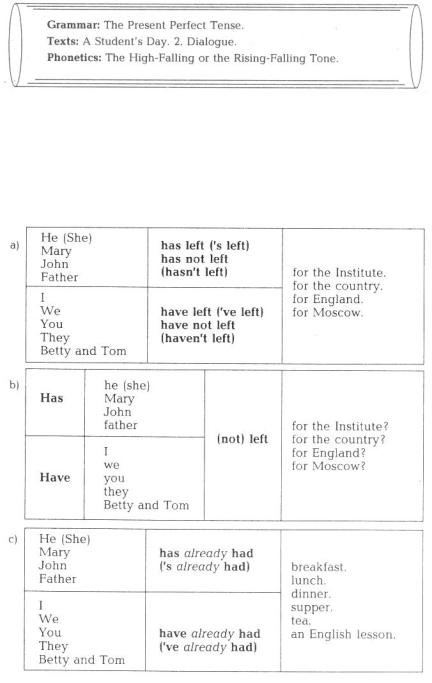
Laboratory work
I. a) Repeat the sentences after the tape. b) Make them interrogative and negative.
II. Change the sentences into indirect speech. Begin each of them with He asks me ...
III. Supply short answers according to the model.
M o d e l : I am hungry. - So am I.
IV. Translate the sentences into English using the given word combinations.
V. Listen to the sentences on the tape. They are not true to fact. Correct them.
VI. a) Listen to the text "The Browns' Dining-Room". Translate it sentence by sentence in the intervals. b) Ask each other questions on the text. c) Retell the text. d) Write it down.
Lesson Thirteen
Study the following
T a b l e N o . 1
The present perfect tense
111
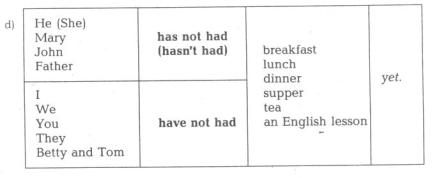
Contracted forms
We've left. - We haven't left. He's left. - He hasn't left.
Grammar exercises
I. Study Substitution Table No. 1 and compose as many sentences as you can.
II. Spell and transcribe the four forms of the following verbs:
be, do, have, see, strike, get, open, turn, wash, take, dry, clean, go, dress, put, make, sweep, clear, stay, say, hurry, begin, prepare, come, work, press, iron, gather, play, repair, knit, listen, hang, change, want, finish, know, help, fire, show.
III. Answer the following questions:
1. Have you had dinner yet? 2. Have you had coffee today? 3. Has your brother left for Kiev? 4. Has she ever met my elder brother? 5. Has Mary been to the canteen yet? 6. Have you found anything to your taste on the menu? 7. Have they paid for the lunch yet? 8. What book have you discussed today? 9. How much have you paid for the supper? 10. You have learned this poem by heart, haven't you? 11. You have made few mistakes in spelling, haven't you? 12. Where have you found this book? 13. Which lesson have you learned by heart? 14. What English books have you read yet?
IV. Choose the right verb:
to tell - to say
1. Mr. Smith ... Mr. Brown it is time to have a break for lunch. 2. Mr. Sandford ... his son he is going to
London. 3. Mrs. Watson ... her children that they must not go out on such a nasty day. 4. Susan ... her friends
that she has a lot of work to do. 5. Mrs. Smith ... her sons that she has already made toasts for them. 6. John ...
his brother is a perfect sportsman. 7. The boy ... he is not going to stay at home on such a fine day. 8. Tom ...
his friend that he is always up at eight. 9. The mother ... that she has already served breakfast. 10. The teacher ...
the student that he has made only a few mistakes in pronunciation. 11. The boy ... he has already aired the
room. 12. The girl... her mother that she doesn't like boiled eggs. 13. The monitor ... we are going to have a
sitting of our English club tonight. 14. Mike ... his little brother is a very hard-working boy.
V. Use the following sentences in indirect speech. Make all the necessary changes:
1.Mary says to me: "I am already finishing this book." 2. The girl says to her mother: "I don't like porridge."
3.Tom says to his friend: "I am going to the canteen." 4. The boy says to me: "I'm thirsty." 5. The teacher says to the students: "You must be ready for the written test tomorrow." 6. Nick says to his mother: "I have already had dinner." 7. Boris says to me: "My father is leaving for Kiev." 8. Nick says to me: "I have already paid for the lunch." 9. Ida says to her friends: "There is nothing to my taste on the menu." 10. The girl says to her sister: "I haven't finished my supper yet." 11. Tom says: "I can speak two foreign languages: English and Spanish."
112
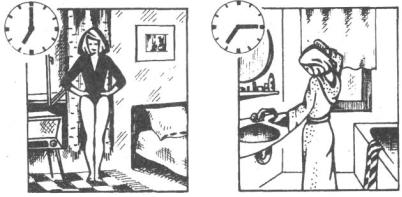
12. Mary asks: "Has the bell gone?" 13. Tom asks: "Is Mary staying at home?" 14. Nick says to Ann: "Don't forget to air the room." 15. John asks his father: "Has she left?" 16. Tom asks Mary: "What is our next lesson?"
TEXT 1
A students day
1. What is there in this picture? There is a bedroom in it. Is it still dark in the room? No, it is already light. What time is it now? The clock has just struck seven. Who(m) do you see in this picture? We see Mary in it. Is she still asleep? No, she is not. She is already up, she has opened the window and turned on the radio. She is doing her morning exercises to the music. What is she going to do next? She is going to have a wash.
2.It is a quarter past seven. Mary is in the bathroom. She has just taken a cold shower, dried herself on the towel and cleaned her teeth. Now she is doing her hair before the looking-glass. What is she going to do next? She is going to dress.
3.Mary is in the bedroom again. She has already brushed her clothes and shoes. What is she doing now? She is dressing. She has just put on her dress. She is putting on her shoes now. Has she made her bed yet? Yes, she has.
4.It is a quarter to eight The family has already had breakfast. While Mary is sweeping the floor with a broom her mother is washing up. Is Mary going to stay at home? No, she is not. She is going to the Institute.
5.It is eight o'clock. Mary is hurrying to the Institute. She is a first-year student of the English faculty. Her classes begin at half past eight. Mary is never late for her classes. Does she walk to the Institute? No, she does not. She goes to the Institute by Metro. How long does it take her to get to the Institute? It takes her half an hour to get there.
6.It is two o'clock. Has the bell gone? Yes, it has. The classes are over. Mary and her friends are having dinner. Are they going home after dinner? No, they are not. Mary is going to the laboratory to have some practice in pronunciation. Her friends are going to the reading-room to prepare their homework there.
113
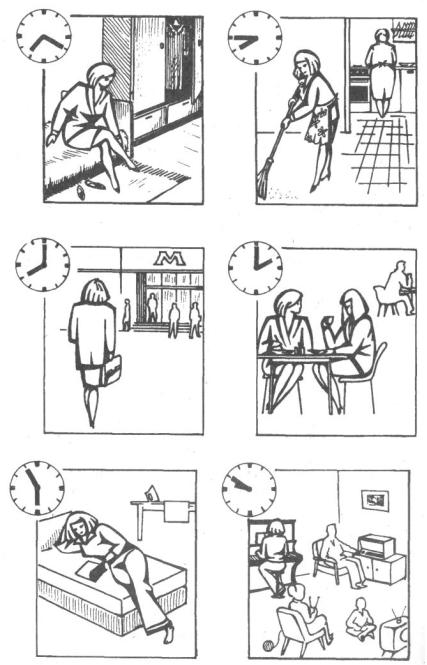
7.It is nearly six o'clock in the evening. Mary has just come home after a walk. She is having a short rest now. She is reading. Is Mary going to do any work about the house? Yes, she is She is going to iron her father's shirts.
8.It is ten minutes to ten. The working day is over. The family are all together, Mary is playing the piano. Her brother David is repairing the TV-set. Their mother is knitting. Their father is going to turn on the radio and listen to the news. The family are not going to bed yet.
TEXT 2
Dialogue
E d w a r d : Hello, Mary!
M a r y : Hello, Eddy. It's so nice to see you. Come in, please. (Edward comes in, takes off his coat and hangs it on the hook.)
E d w a r d : Look here, Mary, there's a concert this evening at the club. You are sure to like it. What about going there together?
M a r y : Oh, I'm sorry I can't. I'm making a new dress. I want to wear it at our party and I haven't finished it
114
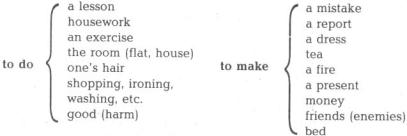
yet.
E d w a r d : Oh, dear, we haven't been to the club for ages. Besides, it's a pity to stay at home on such a fine day, you know.
M a r y : All right. Eddy. But will you help me before we go? E d w a r d : Oh, yes, why not?
M a r y : Something has gone wrong with my electric iron. (Mary gives the iron to Edward.) Can you put it right?
E d w a r d : Let me have a look at it. (Edward examines the iron.) Well, there's nothing the matter with the iron. I'm sure it's the plug.
(Edward repairs the plug. Mary goes out to change. Then she comes back to Edward.)
E d w a r d : Here you are.
M a r y : How clever of you! Thank you ever so much! E d w a r d : Not at all. Are you ready to go now?
M a r y : Just a moment! I must switch off the light.
E d w a r d : Hurry up then. We're going to be late, I'm afraid. M a r y : I'm ready. Come on. (Mary and Edward hurry out.)
Vocabulary notes
to be asleep ; Ant. to be awake
to turn on (off) the light (electricity, water, gas, TV-set, radio, tape-recorder, lamp, tap)
) ( , , , , , , , ); Syn. to switch on (off).
to (the) music
wash vt , to have a wash ; to wash one's hair ; to wash clothes (linen)
, ; to wash up
to take (to have) a bath (shower) ,
to dry (oneself) on (with) a towel )
clean vt , ; to clean one's teeth (nails, clothes, shoes) ( ,
, ); to clean the blackboard ; to clean the room (the flat)
); to clean the window
brush vt ( ); to brush one's clothes (shoes, teeth) ( ) ( ,
)
to put smth. on ., . g. Put your coat on. It's cold. Ant. to take smth. off ., . g. He took his hat off and entered.
sweep (swept, swept)
a first-year student
classes n pl. ; in class , . g. We have done this exercise in class, after classes, e. g. What are you going to do after classes?
to be late for , . g. Don't be late for the lecture.
go (went, gone) vi ; to go by bus (tram, train, Metro) ( , , ); to go to bed
It takes her (half an hour) ... ..., e. g. It doesn't take him long to prepare his homework. How long has it taken you to read this book?
get (got, got) vt/i ; to get to a place .; to get up
Has the bell gone? ?
115
to be over , . g. The lesson is over.
practice n , ; to have practice in smth. , ; practise vt iron vt ; to iron linen ; Syn. to press clothes (not linen) ; (electric) iron n
)
to play the piano (the guitar, the violin) ( , ), to play chess (tennis)
( )
repair vt ; Syn. to put right
news n (plural in form, but treated as singular) , . g. What's the news? ? the news
It is so nice to see you. .
Look here, Mary ... , ...
sure adj; to be (feel) sure of smth. ., .g. We are sure of our future. We are sure that he will come. You are sure to like it. = You will certainly like it.
for ages
Something has gone wrong with ... ...
to have a look at smth.
There's nothing the matter with the iron. .
How clever of you! ! So kind of you! !
Topical vocabulary
to be short of time = to be pressed for time; spare time; on the way home, on the way to..., in town, out of town; to be through with smth; to look through smth. (newspaper, article, text); to look forward to smth. (doing smth.); to manage to do smth., to look in; to listen in; to watch a TV programme; to go to the laundry; the hairdresser, the barber, the cleaner's; to have one's hair done, one's clothes cleaned, to have a manicure
Phonetic notes
Compound verbs have usually two primary stresses:
e. g. She is putting 'on her \shoes. I must switch 'off the \light.
Exercises
I. a) The material below it to be prepared for reading. Mark the stresses and tunes. Concentrate your attention on the vowel [ ] and the consonant [h]. b) Let your fellow-student read the exercise aloud for you to detect his errors in sounds and tell him what must be done to eliminate them:
[ ] 1. "What an odd clock," said Tom.
2.Lots and lots of clocks and watches have gone wrong.
3.Molly's got a spot on her frock.
4.A watched pot never boils.
5.Honesty is the best policy.
[h]1. Helen's husband hates hot tea.
2.He held her hand in his.
3.The horn of the hunter was heard on the hill.
4.Healthful habits make healthy bodies.
5.He that has ears to hear let him hear.
6.My heart's in the Highlands.
My Heart is not here.
II. Before you start working at the text practise the sounds in the following words and word combinations:
A. 1. [ ] is going to, is putting on, is sweeping the floor, is washing the dishes.
116
2.a) Alveolars replaced by dentals: opened the window, on the radio, in the bathroom, about the
house.
b)Loss of plosion: what time, and turned, and cleaned, just taken, just come.
c)No glottal stop: is awake, has opened, turned on.
B. 1. [ ] such a fine day, nothing the matter.
2.a) Alveolars replaced by dentals: on the hook, at the club, repairs the plug.
b)Loss of plosion: about going, haven't been to, want to have, goes out to change.
c)No glottal stop: takes off, what about, goes out, not at all.
III. 1. a) Listen to the recording of the text "A Student's Day". Mark the stresses and tunes. b) Practise the text for test reading. Listen to the recording very carefully until you can say it in exactly the same way.
2. a) Listen to the recording of the dialogue. Mark the stresses and tunes. b) Practise the dialogue for test reading. Listen to the recording very carefully until you can say it in exactly the same way. c) Memorize the dialogue and dramatize it.
IV. Transcribe the following sentences, mark the stresses and tunes and picture them on the staves:
1. Hello, Mary! 2. Look here, Mary, there is a concert this evening at our club. 3. Well, we haven't been there for ages. 4. Let me have a look at it. 5. We're going to be late, I'm afraid.
V. Answer the following questions:
1. (At) what time do you get up? 2. Is it light when you get up? 3. You do your morning exercises to music, don't you? 4. What do you do in the bathroom? 5. What do you do with a tooth-brush (a towel, a comb)? 6. Do you take a shower in the morning or before you go to bed? 7. What do you clean your teeth with? 8. What do you dry yourself on? 9. You do your hair before a looking-glass, don't you? 10. At what time do you usually have breakfast? 11. What must you do with the dishes after having a meal? 12. What do you usually do before you leave the University? 13. What do you clean your flat with? 14. (At) what time do you leave for the University? 15. It takes you long to get to the University, doesn't it? 16. How long does it take you to get to the University? 17. Do you go to the University by bus? 18. (At) what time do your classes begin? 19. What do you do when the classes are over? 20. Where do you usually have dinner? 21. Do you prepare for your English lessons at home or do you prefer to work in the University reading-room? 22. How long does it take you to do your homework? 23. Do you work at the laboratory every day? 24. When do you usually come home? 25. What do you usually do when you come home? 26. In what way do you help your mother about the house? 27. What do you do with an iron (a vacuum-cleaner, a broom)? 28. What do you usually do in the evening? 29. Do you often go to the theatre or to the cinema? 30. You are fond of skating, aren't you? 31. What do you do when you stay at home in the evening? 32. Do your friends often come to see you? 33. How do you spend the time when your friends come to see you? 34. You listen to the news every day, don't you? 35. What do you do when you are going to listen to the latest news? 36. (At) what time do you usually go to bed? 37. Who does the shopping in your family?
VI. a) Write the interrogative and negative forms of the following sentences. b) Ask and answer questions on the following statements as in the model. Use the Present Perfect Tense. Add a sentence or two to develop a situation.
M o d e l : He has already repaired the iron. Has he repaired the cassette-recorder yet? No, he hasn't. But he is sure to do it soon.
1. Mary has already ironed the table-cloth. 2. I have already turned off the light. 3. The girls have already done the room. 4. It takes me long to prepare for my English lesson. 5. It has taken Peter five minutes to shave. 6. We are going to the skating-rink after classes. 7. My sister is very good at sewing. 8. Peter is going to repair our TV-set. 9. We are going for a walk after classes. 10. I must do some knitting today.
VII. a) Write questions to the parts of the sentences in bold type. b) Each sentence describes a situation in a
117
concise way. Find out some more details about it by asking questions. Work in pairs:
1. I have dinner at two. 2. I leave for the Institute at eight o'clock. 3. I go to the Institute by bus. 4. It has taken me three hours to do my homework. 5. David has already repaired the radio. 6. It has taken me a fortnight to knit this sweater. 7.I am going to have some practice in intonation at the laboratory. 8. I am going to the theatre today. 9. Robert is going to press his coat. 10.I do my room with a vacuum-cleaner once a week. 11. You needn't switch on the light, it is quite light. 12. Mary has gone to bed. 13. It takes me a quarter of an hour to have breakfast. 14.I take a bath every morning. 15.I go to the Institute by Metro. 16. We are going to the skating-rink. 17.I do my hair with a comb.
VIII. Rewrite the sentences in the Present Perfect using the adverbs already, just.
M o d e l : My brother is going to repair the cassette-recorder. My brother has already repaired the cassetterecorder.
1.I am going to have some practice at the laboratory. 2.I am going to clean the flat. 3. John is going to shave. 4. They are going to have a rest in the country. 5. Ann is going to turn off the gas. 6. The boy is going to brush his clothes, isn't he? 7.I am going to turn on the light. 8. His family are going to listen to the seven o'clock news, aren't they? 9. Who is going to have a bite? 10. What are you' going to do? 11. They are going to stay out of town for a fortnight. 12. I'm going to look through his article.
IX. Make up as many sentences as you can according to the following models. Use the words, word combinations and phrases of the lesson.
M o d e l 1 : I am (not) going to turn on the light. I am (not) turning on the light. I have (already, just) turned on the light. (I have not turned on the light yet.)
M o d e l 2 : Are you going to turn on the light? Are you turning on the light? Have you turned on the light (yet) ?
X. Fill in articles wherever necessary:
1. Mary has taken ... cold shower and is going to dress. 2. Let me have ... look at your translation. 3.I always do ... room with ... vacuum-cleaner. 4. Let's turn on ... cassette-recorder and dance to ... music. 5. What are your fellow-students doing? - Mary is playing ... piano. Peter and David are playing ... chess. 6. I don't go to ...
Institute by ... bus. I prefer to go there by ... Metro. 7. How long does it take you to do ... homework? 8. Something has gone wrong with ... vacuum-cleaner. I am sure it's ... plug. 9. It is not pleasant to go by... Metro on such ... fine day. Let's go on ... foot. 10. Will you turn on ... radio? I should like to listen to ... seven o'clock news. 11. It's ... pity you have never been to ... England. 12. My parents are still in ... town.
XI. Fill in prepositions or adverbs wherever necessary:
1. Ann begins to work ... half past eight. At half past twelve she goes ... to lunch. After lunch she comes back
... her office and works ... four o'clock. At four o'clock she puts ... her hat and coat and goes ... home. 2. The students ... our group are never a minute late ... the classes. 3. It doesn't take me long to get... the Institute. 4. When do you usually get...? 5. Will you turn ... the light? The children are going ... bed. 6. We have turned ...
the cassette-recorder and are going to dance ... the music. 7. When I come ... home I take ... my coat and hang it... the hook. Then I go ... the bathroom, turn ... the tap, wash my hands and dry them ... the towel. 8. What do you press your clothes ...? 9. Have you cleaned ... the table yet? 10. Let's hurry or we'll be late ... the first lesson. 11. What kind of dress are you going to wear ... our party? 12. The button has come ... my coat. – Shall I sew it... for you ? 13. Why have you turned ... the radio ? - I am going to listen ... the seven o'clock news. 14. Are you going ... bus? 15. Hurry ..., I'm short... time. 16. Are you through ... your housework?
XII. Fill in the missing words:
A. 1. Something has gone |
... with the cassette-recorder. Can you put it |
...? 2. She is not up yet; she is still.... 3. |
The classes are over. I am ... |
to go home. 4. I am ready to have a hot ... |
, ... my teeth and go to bed. 5. If you |
118
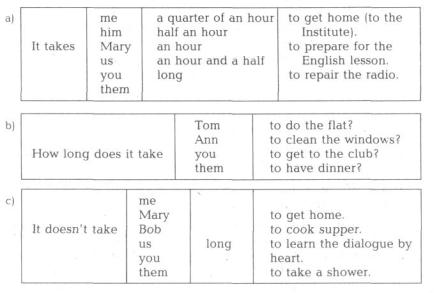
want to have a ..., let's go for a walk. 6. I have |
... my hands and now I am going to ... them on the towel. 7. |
|||||
Before putting on my clothes and shoes I always |
... them. 8. While the mother serves breakfast Susan and Peter |
|||||
... the flat and ... |
the beds. 9.I am going to present my brother with a sweater which I have ... |
myself. 10. In the |
||||
evening we usually have some music or ... to the radio or ... |
the TV programme. Sometimes we ... to see our |
|||||
friends or our friends ... |
to see us. Once a week we go to the cinema or to the theatre. 11 . Do you usually sit up |
|||||
late or do you ... |
to bed early? 12. Peter is a good sleeper, he...... |
late and often has no time for breakfast. 13. If |
||||
the water feels cold on winter mornings you must rub yourself with the ... . |
14. There is a ... |
this evening at the |
||||
club. 15. Something has gone wrong with the .... |
Will you have a ... at it? 16. Please, turn on (off) the ...! 17. |
|||||
Have you cleaned the ... |
? 18. I'm ... for time, will you help me? |
|
|
|||
B. 1. He is forty. His wife is thirty-five. He is ... than his wife. 2. David is ten. Bob is eight. Bob is ... than David. 3. Seventeen is ... than ten. 4. In August the weather is generally ... than in October. 5. In May the days are ... than in March. 6. This book is ... interesting than that one. 7.I think this exercise is the ... difficult. 8. How are you? - Thank you. I'm ... today. 9.I know German ... than English.
C. 1. ... your lessons and be off. 2. You look so smart today. Where have you ... your hair? 3. How could you possibly ... so many mistakes in your dictation? 4. If you want to make a good sportsman you must... morning exercises every day. 5. On her way home mother usually ... some shopping. 6. I'm pressed for time. Will you ...
the room yourself? 7. Skating will ... a lot of good. 8. I'd like you to ... friends with all the students of your group. 9. Isn't it your turn to ... a report today?
XIII. Form one sentence of the given two using the following model.
M o d e l : This mistake is gross. That mistake is not so gross. That mistake is not so gross as this one.
1. These apples are tasty. Those apples are not so tasty. 2. The Volga is long. The Don is not so long. 3. My house is tall. Your house is not so tall. 4. Tom's pronunciation is good. Your pronunciation is worse. 5. The winter in Moscow is cold. The winter in London is not so cold. 6. Your mother is young. My mother is not so young.
XIV. Form as many sentences as you can using the following tables:
XV. a) Respond to the following sentences as in the model.
M o d e l : I have already swept the floor. - Have you?
I haven't aired the room yet. - Haven't you?
1. Mary has gone by bus. 2. The bell hasn't gone yet. 3. I've had much practice in English. 4. Something has gone wrong with the gas stove. 5. I haven't done my washing yet. 6. She has just come. 7. I've done a lot to help
119
him. 8. I haven't been to the club for ages. 9. I've never been late for the lectures. 10. I've already looked through the article.
b) Continue the exercise suggesting your own verbal context.
XVI. Complete the following sentences and let your fellow-student respond to them:
1. I am (not) going to ... . |
2. Are you going to |
...? 3. It has taken me |
... . 4. Something has gone wrong with ... |
||||||
. 5. David is sure to ... . |
6. Are you sure to ...? 7. |
Look here, Mary ... . |
8. I'm afraid ... . |
9. I should like to ... . |
10. |
||||
It is so nice to ... . |
11. What about ...? 12. It doesn't take me long to ... |
. 13. Has it taken you long to ...? 14. How |
|||||||
long does it take ... |
? 15. It's a pity to |
... . 16. It's a pity you haven't ... . |
17. It's a pity he can't ... . |
18. How clever |
|||||
of you to .... 19. I look forward to .... |
20. He can't manage to ... . |
|
|
|
|
||||
XVII. Think of stimulating phrases to which those below could be replies. Work in pairs:
1. Thank you ever so much. 2. No more, thank you. 3. I'm afraid, I can't. 4. Certainly! 5. Here you are. 6. Just a moment. 7. It is out of the question. 8. I'd love to. 9. That's all right.
XVIII. a) Respond to the following sentences. Work in pairs. b) Continue the exercise suggesting your own verbal context of the same type:
1. May I come in? 2. What about going to the country together? 3. Will you help me, Nick? 4. I've read many English books this month. 5. I should like to see that magazine. 6. Shall I air the room? 7. Will you have another cup of tea? 8. Let me have a look at it. 9. Something has gone wrong with my ball-pen.
XIX. Translate the following sentences into English:
A. 1. ? - , . 2. , , ,
. 3. (to air) , . 4.
. 5. ? 6.
? 7. . 8. ? - . 9.
? - . 10. , ? -
. 11. , , . 12.
, . 13. (to plug in), , . 14.
? - . 15. . 16.
? - ( ) . 17. ! - , ( ) . 18. ,
. 19. 12? 20.
. . 21. . 22. , . 23. ? - .
. 24. , (or) . 25. ? - . 26.
. 27. . 28. ? - ( ) . - ? -( )
. 29. ? - . 30. ? - ( )
, . 31. . 32. ,
. 33. ? - . 34. ,
? - .
. 1. .
. , ,
. , . 2.
? - , .
(out-of-doors). 3. ? - .
, . .
, (on the programme) . - (to go out) ? - . - . .
. - , . 4. . . -
. - , ? - . -
? - . . . - ! ! - .
120
